This discussion and review contains spoilers for The Boys season 3, episode 7, “Here Comes a Candle to Light You to Bed.”
The Boys has always been about fantasy.
In its first season, The Boys worked better as a commentary on celebrity culture than as a piece of political commentary, treating its wayward superheroes as out-of-control celebrities insulated from the consequences of their actions and harnessed by more cynical business interests. While the show has gotten more overt in its politics in the past couple of seasons, that element of celebrity remains a central part of the show’s DNA.
After all, most of the archival footage of Soldier Boy (Jensen Ackles) has been filtered through the lens of pop culture, his appearances on chart shows or classic movies. The Legend (Paul Reiser) is more like an agent or a manager than any sort of authority figure. Crimson Countess (Laurie Holden) tried to leverage her celebrity into her charity work for chimpanzees. The third season opens with the Seven playing themselves in a blockbuster riff on their origin story, starring Charlize Theron.
The Boys is far from the only piece of modern pop culture to equate superheroism with celebrity. Much of the Marvel Cinematic Universe treats its superheroes as celebrities and icons. This dates back to Iron Man, in which Tony Stark (Robert Downey Jr.) is introduced as a playboy who is the subject of celebrity profile pieces. However, this approach to superheroes seemed to carry across the MCU, to the point that almost every superhero seems to be a celebrity by Avengers: Endgame.
In The Falcon and the Winter Soldier, a bank manager who rejects Sam Wilson’s (Anthony Mackie) loan application asks for a photo while John Walker (Wyatt Russell) is unveiled as Captain America through a gauntlet of press interviews. New heroes like Kate Bishop (Hailee Steinfeld) or Kamala Khan (Iman Vellani) are introduced as fans of existing characters. Far from being hated and feared, the Hulk (Mark Ruffalo) takes selfies. It’s sad that nobody wants selfies with Ant-Man (Paul Rudd).
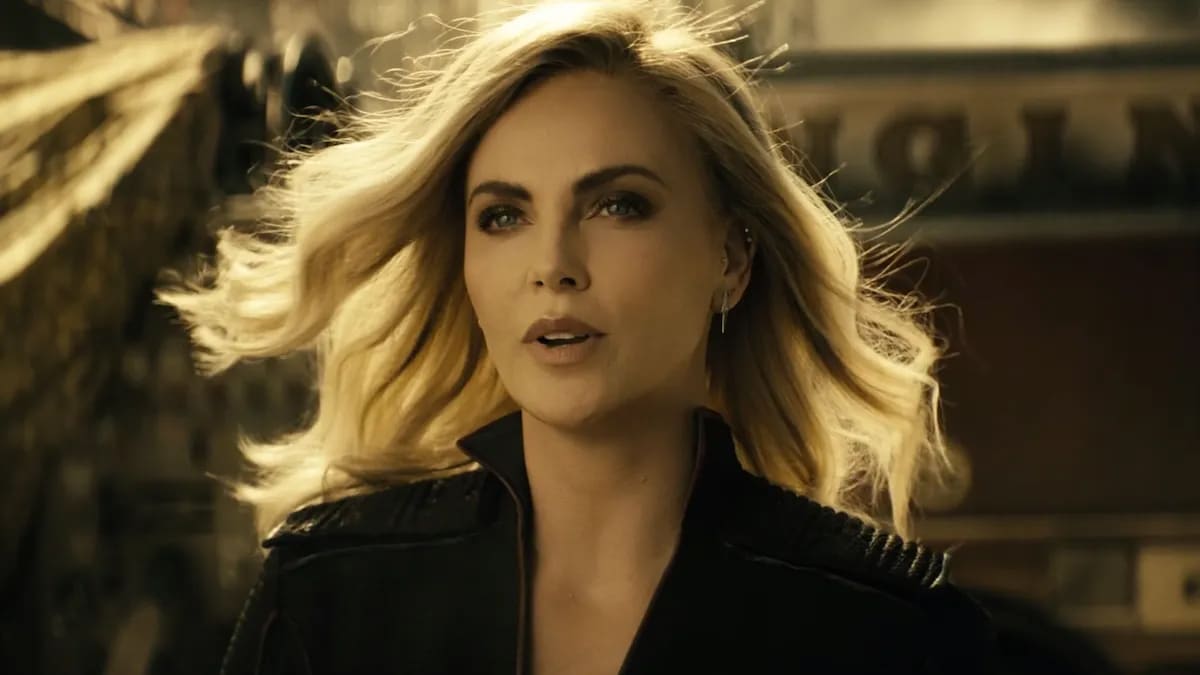
Celebrities are, by their nature, creatures of fantasy. They exist as abstract ideas rather than as real people. Fans and audiences can project elaborate narratives onto them, even constructing convoluted fantasies about them as if they were fictional characters. In that sense, they are not so different from superheroes. The central frisson of The Boys has always existed in the juxtaposition of the traditionally “wholesome” fantasy of superheroes with the grim reality beneath it all.
This juxtaposition of fantasy and reality is at the heart of “Here Comes a Candle to Light You to Bed,” a The Boys episode about how so many members of the cast have effectively cut themselves off from reality and are living in fantasies that will inevitably (and messily) collide with reality. After all, this is an episode in which Soldier Boy seeks to avenge himself on his former teammate Mindstorm (Ryan Blakely), who has the ability to trap people inside their own heads in a “permanent nightmare.”
This theme of blurred fantasy and reality is obvious even in smaller subplots, such as the one focusing on Deep’s (Chace Crawford) sham marriage to Cassandra (Katy Breier) and his inability to understand the reality that he needs her. “I got us this far,” he insists, oblivious of how she has been stage-managing him. Cassandra mockingly repeats, “You got us this far?” Deep is left ranting about his “formidable intellect” as she leaves, but it’s unclear if even he really believes that.
It plays out within smaller scenes, such as a moment in which Homelander (Antony Starr) retreats to the comfort of milking a cow after a particularly stressful public engagement. The sequence is shot to suggest how Homelander sees the experience. It is sensuous and gentle. “Crimson and Clover” by Tommy James and the Shondells plays on the soundtrack. However, the fantasy is abruptly broken when Victoria Neuman (Claudia Doumit) intrudes.
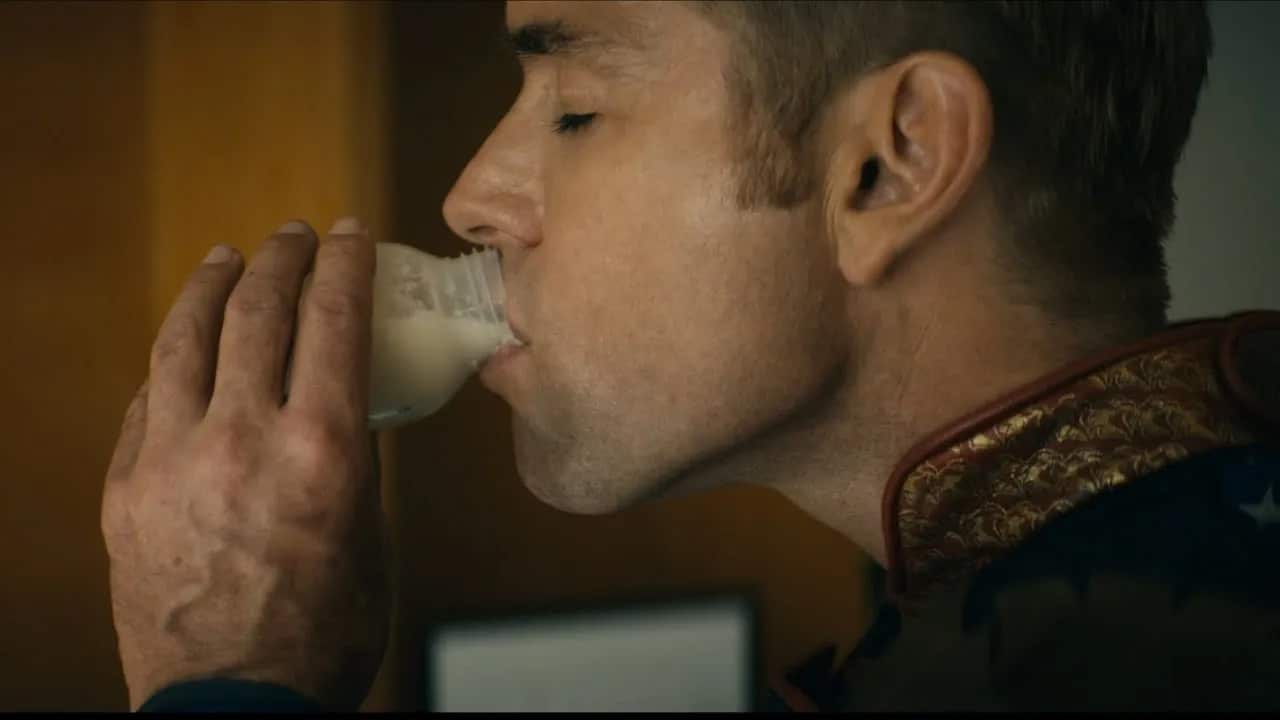
These fantasies often provide an escape. In “Herogasm,” Black Noir (Nathan Mitchell) abandoned Homelander at the first sign of trouble. “Here Comes a Candle to Light You to Bed” reveals that he is hiding in an old abandoned franchise restaurant from his childhood, surrounded by animated anthropomorphic animal friends. “Earving, sooner or later you’re going to have to talk about it,” urges his beaver friend. “This is some tough stuff, I know.” The fantasy is easier than the reality.
Even Soldier Boy is living in his own heroic fantasy. He boasts to Hughie (Jack Quaid) about the importance of military service. “I stormed Normandy,” he boasts. “I fought the Nazis.” Hughie sees through this nonsense. “You didn’t storm shit,” Hughie responds. “Your whole Marlboro Man act? It’s fucking crap.” As the Legend explained to Hughie earlier in the episode, Soldier Boy only stormed Normandy “two weeks after D-Day — for the photo op.”
This gets at one of the larger and more unsettling implications of this emphasis on fantasy within The Boys. It isn’t just individuals who are disconnected from reality. If anything, Soldier Boy is the product of a larger cultural force. He isn’t just living a fantasy; he is a fantasy. “To be American means knowing you’re the hero,” the Legend explains. “So what do we do? We sweep all our filthy shit under the rug, and we tell ourselves a myth like Soldier Boy, and I get stinking rich selling it.”
This is what superheroes and celebrities are. They are a mythology, packaged and sold to an eager audience to create a sort of shared delusion and disconnect from reality. They are stories that allow people to feel good about themselves. It doesn’t matter that they are fantasies. Ashley (Colby Minifie) eagerly rewrites A-Train’s (Jessie T. Usher) backstory into a feel-good white savior narrative starring Tom Hanks that erases the reality of A-Train’s lived experience, because it’s easier to sell.
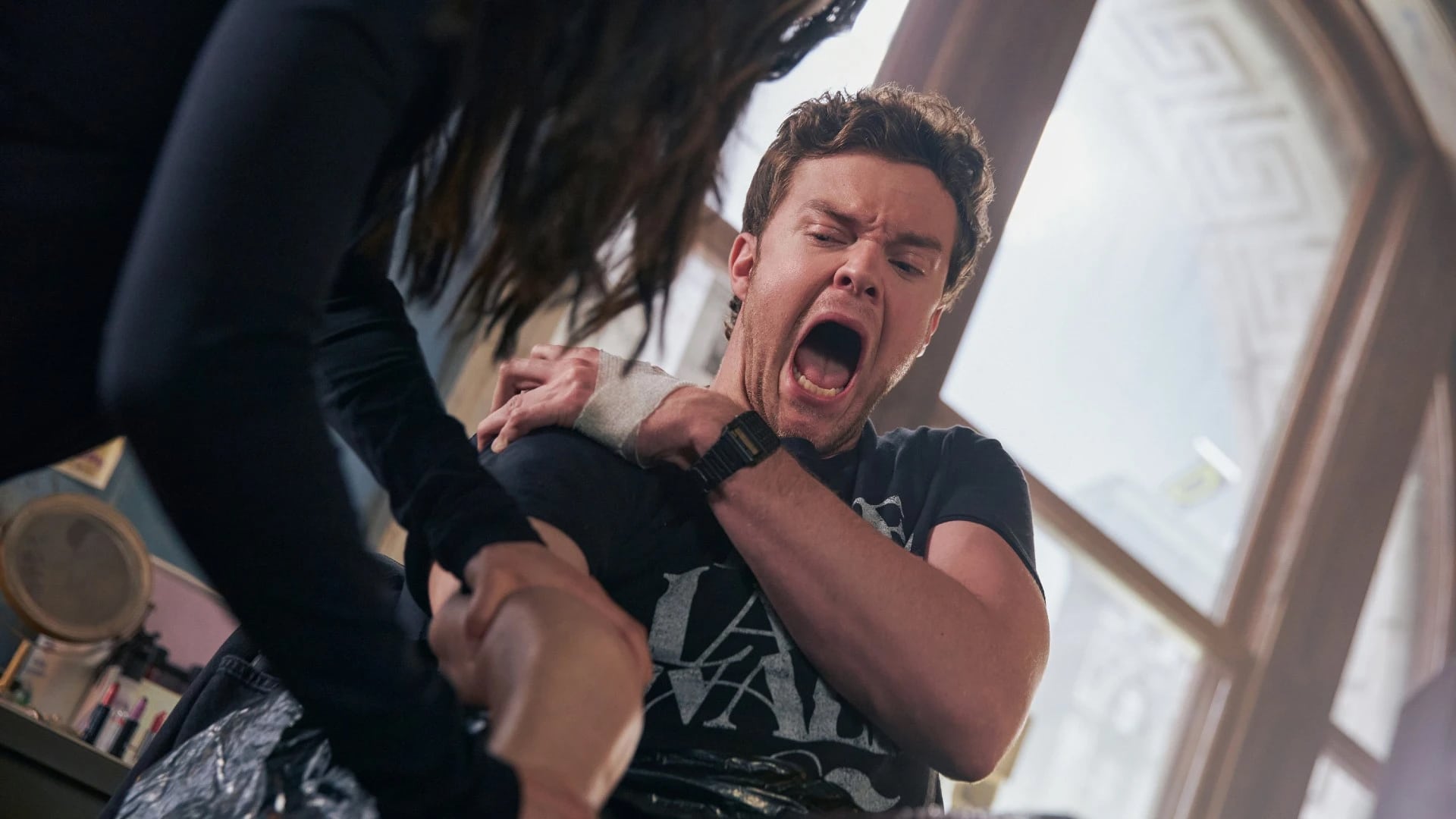
As such, it is no surprise that the first thing that Homelander does when his authority is questioned is to retreat into fantasy, peddling paranoid lies about his enemies. He makes reference to Starlight’s (Erin Moriarty) “alleged involvement with a human trafficking ring,” accusing her of “trafficking kids.” Followers like Todd (Matthew Gorman) eat it up. As Mother’s Milk (Laz Alonso) warns Todd, “He’s feeding you this insane fairy tale, and you’re too stupid and brainwashed to see it.”
As ever, The Boys is hardly subtle. The United States has spent more than half a decade living with “alternative facts,” with high-profile political leaders peddling in lies that accuse their opponents of child abuse and where four in every 10 Americans believe that the last presidential election was illegitimate. So much of this is tied up in the celebrity culture that The Boys brutally satirizes. The cult of QAnon is built around a reality television star and spreads through social media influencers.
It feels appropriate that, given this emphasis on characters retreating into their own fantasy worlds, so much of the third season of The Boys has seen the cast fragmented and scattered. Homelander stands alone, abandoned even by Black Noir. The eponymous team has broken into several smaller fragments, with Butcher (Karl Urban) and Hughie splitting from Milk and Starlight, while Frenchie (Tomer Capone) and Kimiko (Karen Fukuhara) have largely been fending for themselves.
There is no sense of shared reality anymore, which feels like an accurate reflection of the country outside the show. Writers like Peter Nowak have argued that superhero culture resonates with the “hardcore individualism” built into the American character, and the third season of The Boys leans into this by focusing on individuals and smaller groups of characters forced or choosing to go it alone. “Here Comes a Candle to Light You to Bed” suggests the limits of this approach.
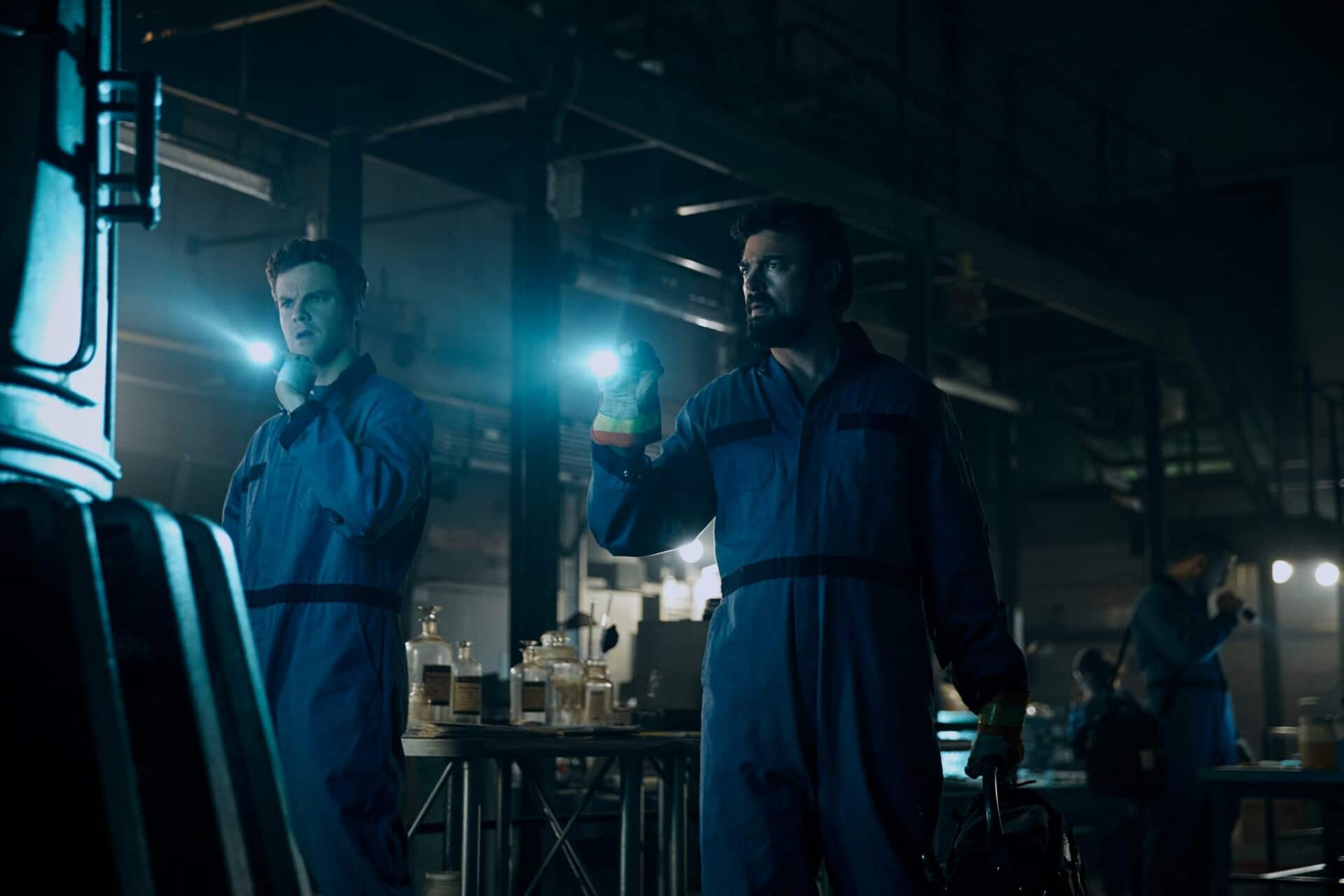
Indeed, Hughie’s big arc in “Here Comes a Candle to Light You to Bed” finds him eventually seeing through the mythology of machismo projected by Soldier Boy. Like Black Noir, he learns that being scared doesn’t make him weak and that retreating into fantasy doesn’t make him strong. Hughie explains, “No one is that tough, and the people who say they are? They’re lying.” He confesses to Mindstorm, “I don’t want to be here. I was pretending to be someone I’m not.”
The Boys is a relentlessly cynical show. Its characters are often trapped in loops of self-perpetuating violence, unable or unwilling to do better. Butcher’s nightmare underscores the extent to which his own violent tendencies were all inherited from the father (John Noble) whom he hates. The episode reinforces this with some fantastic editing that blurs past and present, suggesting that Butcher never really escaped his father.
Even in the episode’s closing moments, after Butcher has relived the trauma of his younger brother’s suicide, there is genuine ambiguity about whether Butcher will do the right thing and listen to Starlight to save Hughie from himself. This is after “The Last Time to Look on This World of Lies” explicitly paralleled Lennie Butcher with Hughie. The Boys suggests that Butcher may not be able to change, even if he wants to. He may not be able to escape the man that his father made him.
However, there is also hope. If Hughie can reject the poisoned and cynical vision of American masculinity peddled by Soldier Boy, maybe he can heal. Maybe if he can reject the comforting fantasy, Hughie can find his way back to reality. The Boys suggests that this would be a real act of superheroism.

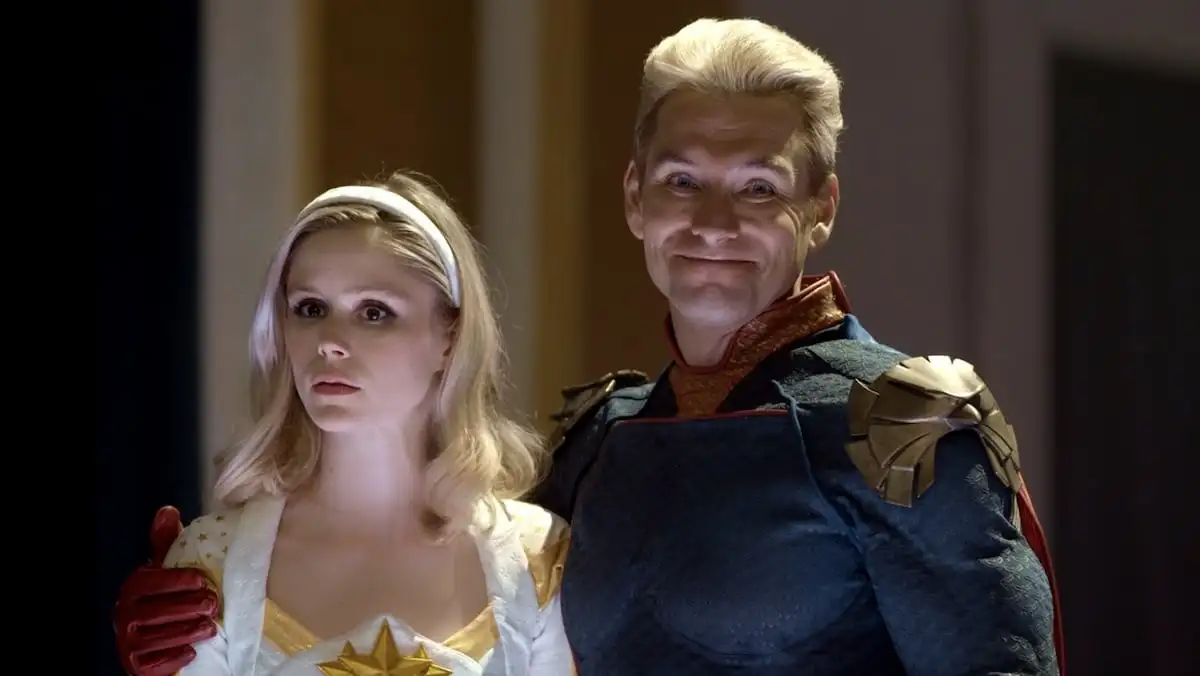




Published: Jul 1, 2022 12:00 pm